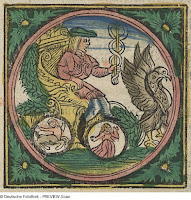WINGED WORDS WINDSDAY
Compiled by Rob Chappell (@RHCLambengolmo)
Vol. 1, No. 24: April 13, 2022
Butterfly Poems!
“To a Butterfly” (1801)
By William Wordsworth (1770-1850)
I’ve watched
you now a full half-hour;
Self-poised
upon that yellow flower
And, little
Butterfly! Indeed
I know not
if you sleep or feed.
How
motionless! – not frozen seas
More
motionless! And then
What joy
awaits you, when the breeze
Hath found
you out among the trees,
And calls
you forth again!
This plot of
orchard-ground is ours;
My trees
they are, my Sister’s flowers;
Here rest
your wings when they are weary;
Here lodge
as in a sanctuary!
Come often
to us, fear no wrong;
Sit near us
on the bough!
We’ll talk
of sunshine and of song,
And summer
days, when we were young;
Sweet
childish days, that were as long
As twenty
days are now.
* * *
Stay near me
– do not take thy flight!
A little
longer stay in sight!
Much
converse do I find in thee,
Historian of
my infancy!
Float near
me; do not yet depart!
Dead times
revive in thee:
Thou brings,
gay creature as thou art!
A solemn
image to my heart,
My father’s
family!
Oh!
Pleasant, pleasant were the days,
The time,
when, in our childish plays,
My sister
Emmeline and I
Together
chased the butterfly!
A very
hunter did I rush
Upon the
prey: -- with leaps and springs
I followed
on from brake to bush;
But she, God
love her, feared to brush
The dust
from off its wings.
“Ode to a Butterfly”
By Thomas Wentworth Higginson (1823-1911)
Thou spark
of life that wavest wings of gold,
Thou
songless wanderer mid the songful birds,
With Nature’s
secrets in thy tints unrolled
Through
gorgeous cipher, past the reach of words,
Yet dear to
every child
In glad
pursuit beguiled,
Living his
unspoiled days mid flowers and flocks and herds!
Thou winged
blossom, liberated thing,
What secret
tie binds thee to other flowers,
Still held
within the garden’s fostering?
Will they
too soar with the completed hours,
Take flight,
and be like thee
Irrevocably
free,
Hovering at
will o’er their parental bowers?
Or is thy
luster drawn from heavenly hues,
A sumptuous
drifting fragment of the sky,
Caught when
the sunset its last glance imbues
With sudden
splendor, and the tree-tops high
Grasp that
swift blazonry,
Then lend
those tints to thee,
On thee to
float a few short hours, and die?
Birds have
their nests; they rear their eager young,
And flit on
errands all the livelong day;
Each
fieldmouse keeps the homestead whence it sprung;
But thou art
Nature’s freeman, free to stray
Unfettered
through the wood,
Seeking
thine airy food,
The
sweetness spiced on every blossomed spray.
The garden
one wide banquet spreads for thee,
O daintiest
reveler of the joyous Earth!
One drop of
honey gives satiety;
A second
draught would drug thee past all mirth.
Thy feast no
orgy shows;
Thy calm
eyes never close,
Thou
soberest sprite to which the Sun gives birth.
And yet the
soul of man upon thy wings
Forever
soars in aspiration; thou
His emblem
of the new career that springs
When death’s
arrest bids all his spirit bow.
He seeks his
hope in thee
Of
immortality.
Symbol of
life, me with such faith endow!
“The Butterfly That Stamped”
By Rudyard Kipling (1865-1936)
Excerpted from the Just So Stories (1902)
This, O my Best Beloved, is a
story — a new and a wonderful story — a story quite different from the other
stories — a story about The Most Wise Sovereign Solomon Ben-David — Solomon the
Son of David.
There are three hundred and
fifty-five stories about Solomon Ben-David; but this is not one of them. It is
not the story of the Lapwing who found the Water; or the Hoopoe who shaded Solomon
Ben-David from the heat. It is not the story of the Glass Pavement, or the Ruby
with the Crooked Hole, or the Gold Bars of Balkis. It is the story of the
Butterfly that Stamped.
Now attend all over again and
listen!
Solomon Ben-David was wise. He
understood what the beasts said, what the birds said, what the fishes said, and
what the insects said. He understood what the rocks said deep under the earth
when they bowed in towards each other and groaned; and he understood what the
trees said when they rustled in the middle of the morning. He understood
everything, from the bishop on the bench to the hyssop on the wall, and Balkis,
his Head Queen, the Most Beautiful Queen Balkis, was nearly as wise as he was.
* * *
There was
never a Queen like Balkis,
From here to
the wide world’s end;
But Balkis
talked to a butterfly
As you would
talk to a friend.
There was
never a King like Solomon,
Not since
the world began;
But Solomon
talked to a butterfly
As a man
would talk to a man.
She was
Queen of Sabaea,
And he was Asia’s
Lord,
But they
both of them talked to butterflies
When they
took their walks abroad!
Maria Sibylla Merian (1647-1717)
was both an accomplished artist and a scientist, becoming the “founding mother”
of the science of entomology. She observed, painted, and wrote illustrated
reference books about pollinators – especially butterflies and moths. In later
life, she participated in a scientific expedition to Suriname to catalog and
study its native insect life. Image Credit: Maria as portrayed by Jacob Marrel (1679), Art Museum of Basel,
Switzerland.


No comments:
Post a Comment
Note: Only a member of this blog may post a comment.